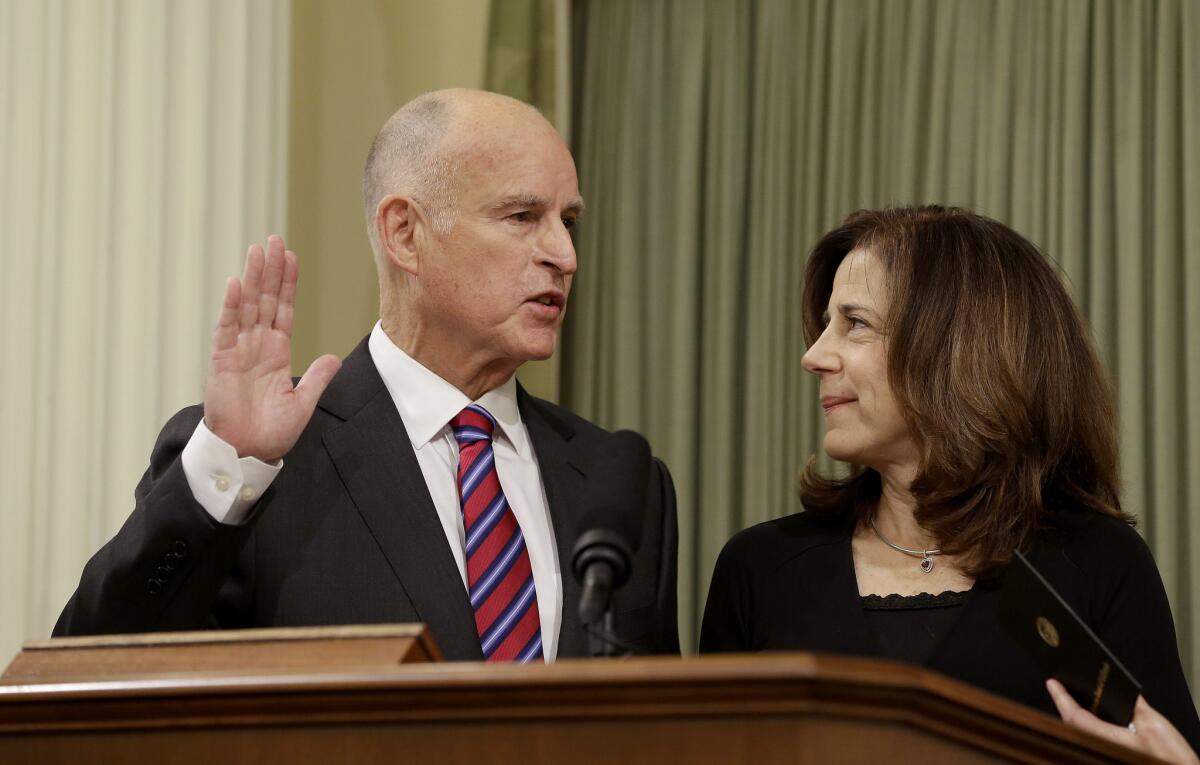Editorial: Exposing the absurdity of loyalty oaths

California Gov. Jerry Brown takes the oath of office for the fourth time as his wife, Anne Gust Brown, looks on during his inauguration at the state Capitol on Jan. 5.
- Share via
Award-winning author James Sallis has spent the last decade teaching writing courses at Phoenix College, blithely unaware that he was violating Arizona law because he had never signed the loyalty oath that is required for all public employees in the state. But someone in the community college’s administration discovered the omission recently and told Sallis he would have to sign the oath to continue working. Rather than do so, he quit.
If this feels like a snap back to the postwar blacklist era, you’re right. And Arizona isn’t alone in clinging to this objectionable relic of the Cold War years. The federal government requires civil servants to sign a loyalty oath as well, as do many states. California, for instance, requires public employees to “bear true faith and allegiance” to the state and national constitutions, and to defend both documents “against all enemies, foreign and domestic.” Employees must also pledge to perform the jobs for which they have been hired. This is silliness. Does the state fear that an employee might subvert democracy, or do a poorer job, without signing such a meaningless statement?
Today’s loyalty oaths are watered down from the obnoxious pledges instituted across the nation during the Red scare era to try to ensure that no communists or other radicals entered government service. In California, the Levering Oath — named for the Republican assemblyman, Harold Levering, who pushed the issue — was adopted by the Legislature in 1951 and two years later added by the voters to the state Constitution. Initially, the Levering Oath required employees to swear that they were not, and had not over the previous five years been, members of an organization that advocated the violent overthrow of the state or federal governments, a definition drafted with communism in mind.
But over time, and after several level-headed Supreme Court decisions, the 1st Amendment violation inherent in requiring signatories to give up their freedom of speech and association became clear, and the most offensive parts of the California loyalty oath were tossed out. Though the full oath remains in the state Constitution, it is only partially enforceable.
While not patently unconstitutional or even terribly objectionable, the current loyalty oath in California is absolutely unnecessary — especially when you consider that public employees who are not U.S. citizens are exempt from signing. Obviously, the oath is not crucial to getting the state’s work completed.
And besides, who really believes people with malign or subversive designs would be stymied by a form attesting that they have no ill intentions?
Although it may make sense to ask the elected officials and law enforcement officers who create and enforce state laws to pledge to uphold and obey the constitutions, it’s silly to require that of rank-and-file workers. Or writing instructors in Arizona.
Follow the Opinion section on Twitter @latimesopinion and Facebook
More to Read
A cure for the common opinion
Get thought-provoking perspectives with our weekly newsletter.
You may occasionally receive promotional content from the Los Angeles Times.









